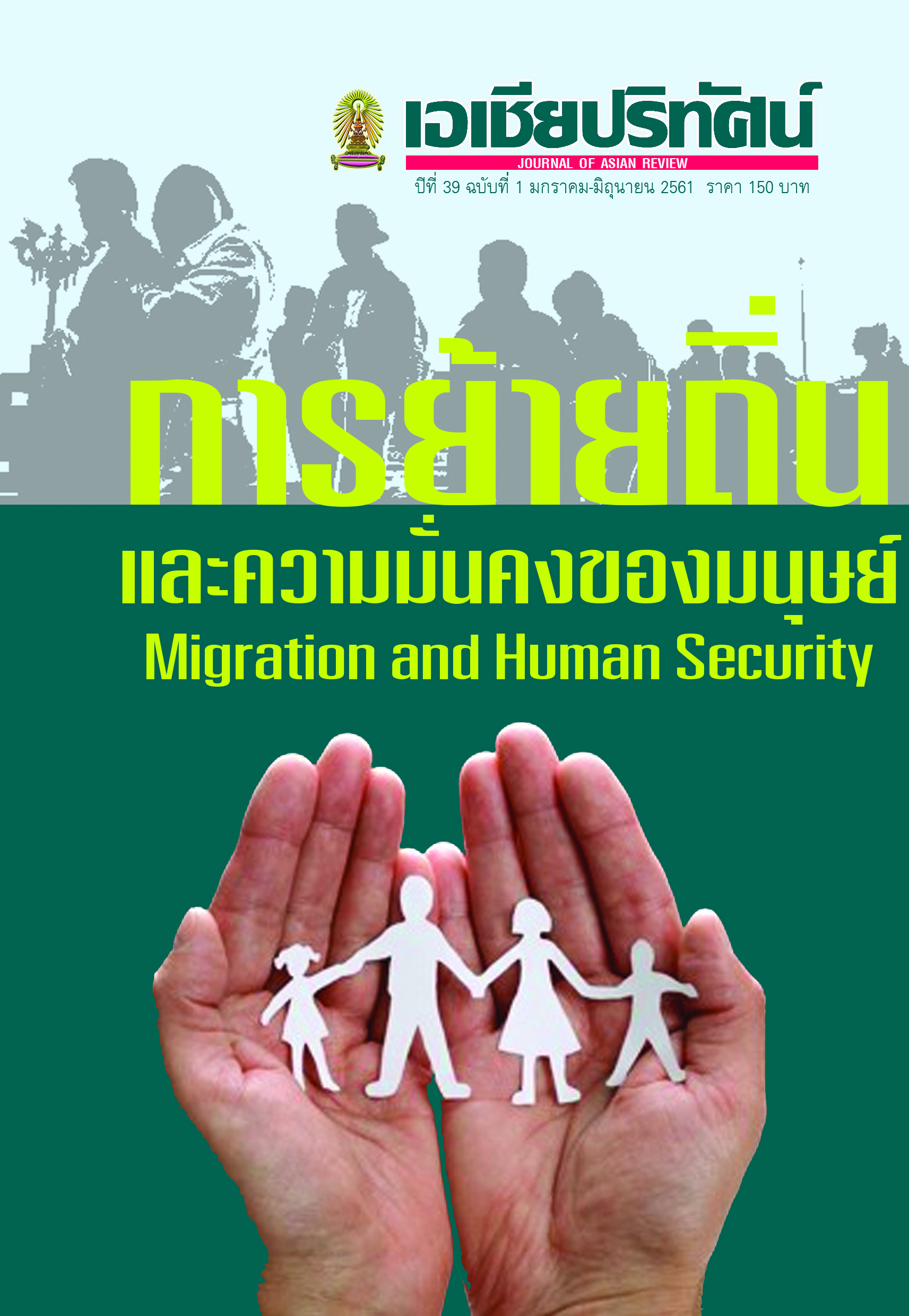ขบวนการแรงงานกับการเปลี่ยนผ่านทางการเมือง กรณีศึกษาการขับเคลื่อนของขบวนการแรงงานเมียนมาในช่วงปี 2011 - 2015
Main Article Content
บทคัดย่อ
บทความชิ้นนี้ต้องการพิจารณาขบวนการแรงงานเมียนมาที่ต้องเผชิญความท้าทายต่างๆในช่วงของการเปลี่ยนผ่านระบอบการเมืองในช่วงปี 2011-2015 โดยผู้เขียนได้รวบรวมข้อมูลการขับเคลื่อนของขบวนการแรงงานโดยเฉพาะการประท้วงในช่วงเวลาที่ศึกษา และประยุกต์ใช้การวิเคราะห์ข้อมูลแบบ Protest Event Analysis (PEA) เพื่อวัดผลกระทบจากโครงสร้างโอกาสทางการเมืองที่มีต่อการขับเคลื่อน
ผลการวิเคราะห์พบว่าการเปลี่ยนผ่านทางการเมืองเป็นโอกาสให้กับการขับเคลื่อน โดยเฉพาะการลดระดับการกดปราบของรัฐและเปิดช่องทางเชิงสถาบัน ทำให้ขบวนการแรงงานสามารถระดมทรัพยากรเข้าสู่การขับเคลื่อนและเติบโตอย่างรวดเร็ว โครงสร้างทางการเมืองเดียวกันนี้ยังก่อให้เกิดความเสี่ยงต่อการขับเคลื่อนด้วยเช่นกัน โดยเฉพาะการทำให้เป็นสถาบันของการจัดการความขัดแย้งระหว่างแรงงานกับนายจ้างภายใต้การกำกับและควบคุมของรัฐ ซึ่งทำให้การขับเคลื่อนของขบวนการอ่อนกำลังลง และขาดมิติของประชาธิปไตยในขบวนการ
ในแง่นี้การเปลี่ยนผ่านทางการเมืองจึงควรถูกพิจารณาอย่างระมัดระวัง และจำเป็นที่จะต้องตรวจสอบและทำความเข้าใจในเชิงลึกเกี่ยวกับโครงสร้างโอกาสทางการเมืองที่ส่งผลต่อขบวนการเคลื่อนไหวทางสังคม
Article Details
เอกสารอ้างอิง
2. Cheesman, N., Farrelly, N., & Wilson, T. (Eds.). (2014). Debating democratization in Myanmar (Vol. 233). Institute of Southeast Asian Studies, The Australian National University.
3. Cohen, J. L., & Arato, A. (1994). Civil society and political theory. Mit Press.
Giugni, M., McAdam, D., & Tilly, C. (Eds.). (1998). From contention to democracy. Lanham, MD: Rowman & Littlefield.
3. Della Porta, D. (Ed.). Methodological practices in social movement research. OUP Oxford.
4. Kuhonta, E. M., Slater, D., & Vu, T. (Eds.). (2008). Southeast Asia in political science: theory, region, and qualitative analysis. Stanford: Stanford University Press.
5. Lwin, K. S. (2013). The evolution of labour politics in post-colonial Myanmar, Doctoral dissertation. City University of Hong Kong.
6. May Sitt Paing (2015). Activists Get Two Years for Role in Shwepyithar Industrial Strikes, Irrawaddy. https://www.irrawaddy.com/news/burma/activists-get-two-years-for-role-in-shwepyithar-industrial-strikes.html
7. Noe Noe Aung (2013). Myanmar Time, Issue 682, June 17 – 23.
O’Donnell, G., Schmitter, P. C., & Whitehead, L. (1986). Transitions from authoritarian rule: Southern Europe (Vol. 1). JHU Press.
8. Schmitter, P. C., & O'Donnell, G. (1986). Transitions from authoritarian rule: Tentative conclusions about uncertain democracies. Johns Hopkins University Press.
9. Soe Sandar Oo (2013). Controversy over ILO vote, Myanmar Time. https://www.mmtimes.com/national-news/6594-controversy-over-ilo-delegate-vote.html
10. Tarrow, S. (1994). Power in movement: Social movements, collective action and politics. Cambridge: Cambridge University Press.
11. The Republic of the Union of Myanmar (2011). The Labour Organization Law, The Pyidaungsu Hluttaw Law No. 7/2011, The 14th Waxing day of Thadinkyut 1373. ME. (11th October, 2011)
12. The Republic of the Union of Myanmar (2012). The Settlement of Labour Dispute Law. The Pyidaungsu Hluttaw Law No. 5/2012, The 6th Waxing day of Tagu 1373, M.E. ( 28th March, 2012)
13. Thmon (2015). Minimum wage retains few fans, Eleven Myanmar. http://www.elevenmyanmar.com/special-focus-social-issue/minimum-wage-retains-few-fans
14. Tilly, C., & Wood, L. J. (2015). Social Movements 1768-2012. Routledge.
15. ไชยวัฒน์ ค้ำชู และ นิธิ เนื่องจำนงค์ (2559). การเมืองเปรียบเทียบ ทฤษฎี แนวคิด และกรณีศึกษา. กรุงเทพฯ : สำนักพิมพ์แห่งจุฬาลงกรณ์มหาวิทยาลัย.
16. ณัฐพล ตันตระกูลทรัพย์. (2560). การเปลี่ยนผ่านสู่ประชาธิปไตยในเมียนมากับการเลือกตั้งทั่วไปในปี 2010. วารสารการเมืองการปกครอง, ปีที่ 7 ฉบับที่ 2, หน้า 48-70
17. ประภาส ปิ่นตบแต่ง (2552), กรอบการวิเคราะห์การเมืองแบบทฤษฎีขบวนการเคลื่อนไหวทางสังคม, กรุงเทพฯ : มูลนิธิไฮน์ริค เบิลล์ สำนักงานภูมิภาคเอเชียตะวันออกเฉียงใต้.
18. สัมภาษณ์, Nandar Sitt Aung (WE Generation Network), 2 ตุลาคม 2017
19. สัมภาษณ์, Sai Yu Maung (Action Labour Rights), 6 ตุลาคม 2017
20. สัมภาษณ์, Thet Thet Aung (88 Generation), 22 กรกฎาคม 2017
21. สัมภาษณ์, Thet Thet Aung (88 Generation), 3 ตุลาคม 2017
22. สัมภาษณ์, Thu Zaw Kyi Win, 20 กรกฎาคม 2017
23. สัมภาษณ์, Wunna Soe (WE Generation Network), 21 กรกฎาคม 2017
24. สัมภาษณ์, หอการค้าจังหวัดกาญจนบุรี (ฝ่ายการค้าชายแดน), 2 มีนาคม 2560


